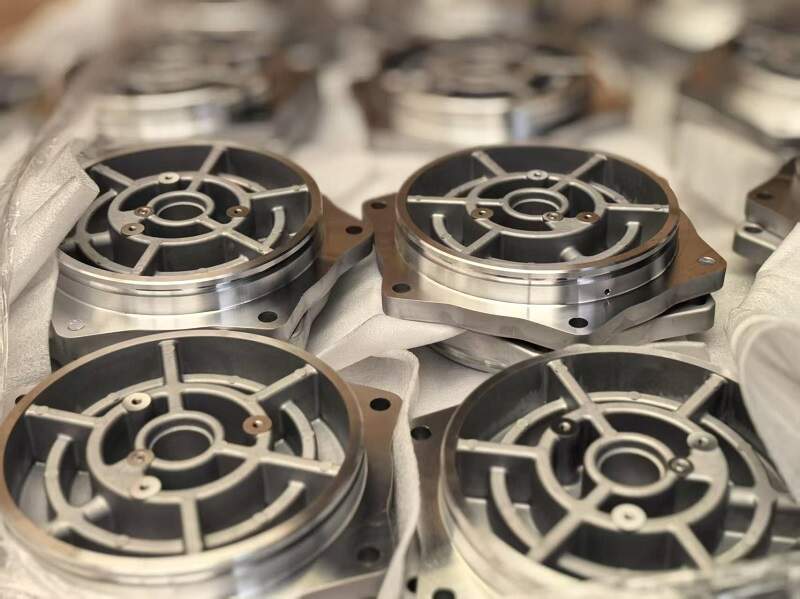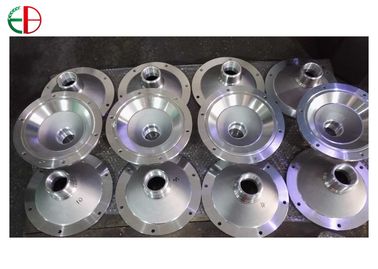Precision aluminum casting methods that improve production efficiency
Wiki Article
The Function of Light Weight Aluminum Foundries ahead of time Lightweight Production Solutions
Light weight aluminum shops significantly add to the evolution of light-weight manufacturing services. Their ingenious spreading technologies produce high-strength, lightweight elements necessary for sectors such as automobile and aerospace. This improvement not only boosts item efficiency yet additionally promotes sustainability through making use of recycled products. As these factories adjust to arising methods and technologies, they pave the means for future developments in producing performance and ecological duty. What lies in advance in this transformative trip?The Benefits of Lightweight Materials in Manufacturing
As industries significantly look for performance and sustainability, the fostering of light-weight materials in manufacturing has actually arised as a crucial strategy - Precision aluminum casting. These materials, especially light weight aluminum and compounds, provide numerous advantages that boost production procedures and item performance. Mainly, their lowered weight adds to reduce power usage during transportation and operation, resulting in substantial price financial savingsFurthermore, lightweight materials help with the layout of even more complicated geometries, enabling greater innovation in product advancement. This adaptability frequently causes improved functionality and efficiency, accommodating the progressing demands of modern-day customers.
In addition, using lightweight products can enhance the durability of items because of their resistance to corrosion and fatigue. This toughness not just reduces maintenance costs yet additionally supports sustainability efforts, as longer-lasting items add to much less waste. To sum up, the benefits of lightweight products are pivotal in driving effectiveness, innovation, and ecological obligation in manufacturing.
Advancements in Light Weight Aluminum Spreading Technologies
Current improvements in aluminum spreading modern technologies are changing the production landscape, particularly in the manufacturing of lightweight parts. Advancements such as high-pressure die casting and vacuum pass away spreading have substantially improved the precision and surface area coating of aluminum parts - aluminum casting. These approaches permit the production of intricate geometries while minimizing material waste and improving mechanical buildings
In addition, the application of real-time surveillance systems guarantees high quality control throughout the spreading process, causing even more constant item results. Collectively, these developments not only improve the performance of aluminum components however also support the sector's shift towards even more sustainable production techniques.
Applications of Aluminum Components in Numerous Industries
While aluminum components have actually long been utilized in different sectors, their flexibility and lightweight properties remain to drive cutting-edge applications throughout fields such as automotive, aerospace, and building. In the vehicle market, aluminum is significantly utilized for engine blocks, wheels, and body panels, enhancing gas effectiveness and efficiency. Aerospace producers leverage light weight aluminum for aircraft structures and elements, taking advantage of its strength-to-weight ratio to enhance fuel economy and payload capability.In the construction industry, light weight aluminum is preferred for home window structures, roof covering, and structural components, giving longevity and resistance to rust while reducing general structure weight. In addition, the electrical and electronic devices sectors take advantage of light weight aluminum's conductivity and light-weight nature, using it in electrical wiring, rooms, and heat sinks. These diverse applications highlight the important duty of light weight aluminum parts, which not only fulfill industry needs yet additionally contribute to advancements in product style and performance throughout numerous fields.
Sustainability and Energy Effectiveness in Aluminum Foundries
The light weight aluminum foundry sector plays a crucial role in advertising sustainability and energy performance, particularly as demand for light-weight elements remains to grow across various industries. Foundries are increasingly taking on ecologically pleasant methods, such as making use of recycled aluminum, which greatly minimizes energy consumption and greenhouse gas discharges compared to main light weight aluminum production.Moreover, innovations in casting innovations improve power effectiveness by maximizing the melting processes and decreasing waste. Methods like die spreading and investment spreading permit specific product use, reducing excess and scrap.
Additionally, numerous factories are buying renewable resource sources to power procedures, better lowering their carbon impact. Executing energy management systems read review enables foundries to keep track of and enhance power use, ensuring they operate at peak efficiency.

Future Fads in Lightweight Manufacturing Solutions
Exactly how will arising technologies shape the future of lightweight manufacturing solutions? Advancements such as advanced products, automation, and additive production are readied to redefine manufacturing processes. The assimilation of wise production innovations, including the Net of Things (IoT) and expert system (AI), will enable real-time tracking and optimization, enhancing efficiency and decreasing waste.
As sustainability remains to be a critical problem, light-weight services will increasingly focus on recycling and recycling products, straightening with circular economy concepts. This advancement in lightweight manufacturing will certainly not only boost product performance yet also add to environmental goals, guaranteeing that the industry continues to be competitive in a swiftly transforming market landscape.
Frequently Asked Inquiries
Just How Do Aluminum Foundries Ensure High Quality Control in Production?
Aluminum shops ensure quality assurance in manufacturing through strenuous testing, standardized procedures, and continual tracking - aluminum casting. They execute competent employees and advanced modern technologies to keep consistency, decrease problems, and meet market standards throughout the production processWhat Are the Key Tests Dealt With by Light Weight Aluminum Foundries?
Aluminum foundries deal with challenges such as changing raw material costs, keeping production performance, making certain consistent quality, adjusting to technical advancements, and meeting environmental regulations, all of which impact their total operational Going Here effectiveness and competitiveness on the market.How Does Light Weight Aluminum Recycling Influence Factory Workflow?
Aluminum reusing considerably enhances shop operations by reducing basic material prices, reducing energy usage, and decreasing environmental impact. This lasting practice makes it possible for factories to enhance effectiveness while meeting try this web-site enhancing need for light-weight, high-performance aluminum products.What Abilities Are Required for Workers in Aluminum Foundries?
Employees in light weight aluminum shops need abilities in metallurgy, machining, quality assurance, and safety and security practices. Efficiency in operating machinery, comprehending alloy properties, and analytical are also necessary for effective manufacturing and keeping high security standards.Just How Do Aluminum Foundries Handle Waste Monitoring?
Light weight aluminum foundries take care of waste via recycling scrap metal, using reliable waste segregation techniques, and sticking to ecological laws. They apply lasting methods to lessen landfill payments, ensuring that unsafe products are thrown away sensibly.Light weight aluminum foundries considerably add to the advancement of lightweight manufacturing options. Current advancements in aluminum spreading modern technologies are revolutionizing the production landscape, particularly in the production of light-weight elements. While aluminum parts have actually long been made use of in various industries, their convenience and lightweight properties continue to drive ingenious applications across industries such as automobile, aerospace, and building and construction. Additionally, the electric and electronics industries profit from light weight aluminum's conductivity and lightweight nature, utilizing it in wiring, enclosures, and warm sinks. The light weight aluminum factory industry plays a crucial role in promoting sustainability and energy effectiveness, specifically as need for light-weight elements proceeds to grow throughout different markets.
Report this wiki page